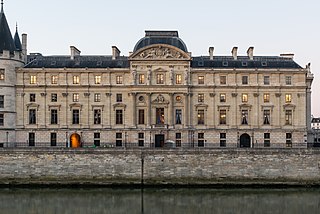
The Court of Cassation is one of the four courts of last resort in France. It has jurisdiction over all civil and criminal matters triable in the judicial system; it is the supreme court of appeal in these cases. It has jurisdiction to review the law, as well as to certify questions of law, to determine miscarriages of justice. The Court is located in the Palace of Justice in the 1st arrondissement of Paris.

The Judicial Yuan is the judicial branch of the government of the Republic of China on Taiwan. It runs a Constitutional Court and oversees all systems of courts of Taiwan, including ordinary courts like the supreme court, high courts, district courts as well as special courts like administrative courts and disciplinary courts. By Taiwanese law, the Judicial Yuan holds the following powers:
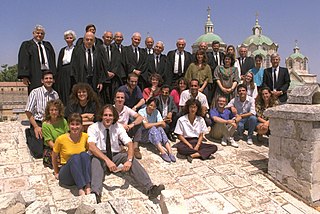
A law clerk, judicial clerk, or judicial assistant is a person, often a lawyer, that provides direct counsel and assistance to a lawyer or judge by researching issues and drafting legal opinions for cases before the court. Judicial clerks often play significant roles in the formation of case law through their influence upon judges' decisions.Judicial clerks should not be confused with legal clerks/paralegals, court clerks, or courtroom deputies who perform administrative duties within the legal profession and perform more quasi-secretarial duties than law clerks, or legal secretaries that only provide secretarial and administrative support duties to attorneys and/or judges.

Under the Constitution of Finland, everyone is entitled to have their case heard by a court or an authority appropriately and without undue delay. This is achieved through the judicial system of Finland.

The judicial system of Turkey is defined by Articles 138 to 160 of the Constitution of Turkey.

The High Court of Singapore is the lower division of the Supreme Court of Singapore, the upper division being the Court of Appeal. The High Court consists of the chief justice and the judges of the High Court. Judicial Commissioners are often appointed to assist with the Court's caseload. There are two specialist commercial courts, the Admiralty Court and the Intellectual Property Court, and a number of judges are designated to hear arbitration-related matters. In 2015, the Singapore International Commercial Court was established as part of the Supreme Court of Singapore, and is a division of the High Court. The other divisions of the high court are the General Division, the Appellate Division, and the Family Division. The seat of the High Court is the Supreme Court Building.

The Supreme Court of Finland, located in Helsinki, is the court of last resort for cases within the private law of Finland. The Court's counterpart is the Supreme Administrative Court, which is the court of last resort for cases within the administrative law.

A supreme court is the highest court within the hierarchy of courts in most legal jurisdictions. Other descriptions for such courts include court of last resort, apex court, and highcourt of appeal. Broadly speaking, the decisions of a supreme court are not subject to further review by any other court. Supreme courts typically function primarily as appellate courts, hearing appeals from decisions of lower trial courts, or from intermediate-level appellate courts.
The Judiciary of Colorado is established and authorized by Article VI of the Colorado Constitution as well as the law of Colorado. The various courts include the Colorado Supreme Court, Colorado Court of Appeals, Colorado district courts, Colorado county courts, Colorado water courts, and municipal courts. The administration of the state judicial system is the responsibility of the Chief Justice of the Colorado Supreme Court as its executive head and is assisted by several other commissions. In Denver, the county and municipal courts are integrated and administratively separate from the state court system.
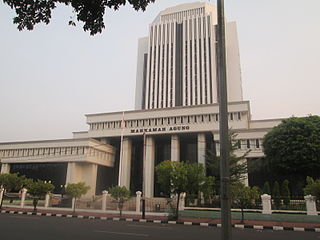
The Judiciary of Indonesia constitutionally consists of the Supreme Court of Indonesia, the Constitutional Court of Indonesia, and the lesser court system under the Supreme Court. These lesser courts are categorically subdivided into the public courts, religious courts, state administrative courts, and military courts.

The Supreme Court, earlier known as the Supreme Court of Cassation, is the court of last resort in the Republic of Serbia. It is the court of cassation which reviews and possibly overturns previous rulings made by lower courts. It was established in 1846 by a decree of Prince Aleksandar Karađorđević. In the last 160 years since it was established, the Court has asserted its authority within judiciary in Serbia and beyond. The Supreme Court is today authorized by the Constitution of Serbia and the Law on Organization of Courts.

The Supreme Court of the Republic of Albania is the highest court of Albania and is the final court of appeals in the country's judicial system. It is composed of seventeen judges: the Chief Justice and sixteen Members.
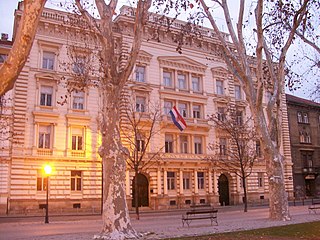
The judiciary of Croatia is a branch of the Government of Croatia that interprets and applies the laws of Croatia, to ensure equal justice under law, and to provide a mechanism for dispute resolution. The legal system of Croatia is a civil law system, historically influenced by Austrian, Hungarian and Yugoslav law, but during the accession of Croatia to the European Union, the legal system was almost completely harmonised with European Union law. The Constitution of Croatia provides for an independent judiciary, led by a Supreme Court and a Constitutional Court. The Ministry of Justice handles the administration of courts and judiciary, including paying salaries and constructing new courthouses. It also administers the prison system.
The Judiciary of Kosovo is the collection of the central Kosovo institutions that exercises judicial authority in Kosovo. According to the 2008 Constitution of Kosovo, the judicial system is composed of the Supreme Court and subordinate courts, a Constitutional Court, and an independent prosecutorial institution. The courts are administered by the Kosovo Judicial Council.

The Judiciary of the Netherlands is the system of courts which interprets and applies the law in the Netherlands.

State's Attorney Office of the Republic of Croatia is an autonomous and independent judicial body empowered and duty-bound to instigate prosecution of perpetrators of criminal and other penal offences, to initiate legal measures to protect the property of the Republic of Croatia and to apply legal remedies to protect the Croatian Constitution and laws.

The Supreme Court of Iran is the highest juridical authority in Iran, established to supervise the correct implementation of laws by courts of justice and consisting of the most prominent judges of the country. The head of the judiciary assigns criteria to ensure uniformity of judicial procedure and to carry out all legal responsibilities.

The State Judicial Council or DSV is the national council of the judiciary of Croatia. It ensures the autonomy and independence of the judicial branch in the Republic of Croatia by autonomously deciding on the appointment, promotion, transfer, dismissal and disciplinary accountability of judges and presiding judges.

The Supreme Court of the Dominican Republic is the highest court existing in the Republic and is, therefore, the head of the judiciary in the country.
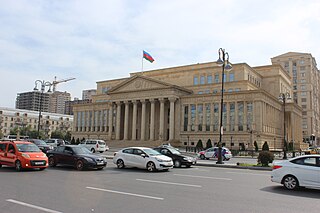
Supreme Court of Azerbaijan is the highest court instance and final court of appeal of three-staged judicial system in Azerbaijan. Established in pursuant Article 131 of the Constitution of the Republic of Azerbaijan and Article 77 of the Law "on Courts and Judges". Supreme Court has competence to carry out justice on civil, criminal disputes and other cases related to the execution of general or specialized courts. Despite being established in Baku, its jurisdiction applies to the entire territory of the Republic of Azerbaijan.


















